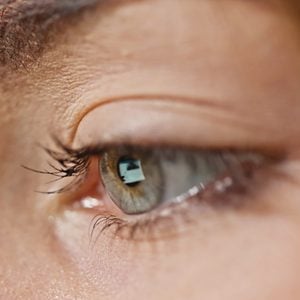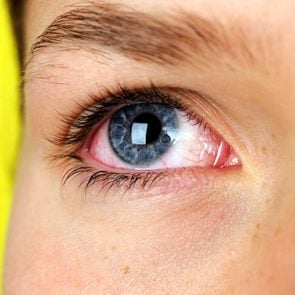What Does It Mean When Your Eye Twitches?
Updated: Jul. 27, 2022
Eye twitching can be an unpleasant, even scary sensation. Here's what the experts want you to know, including how to stop eye twitching.
What does it mean when your eye twitches?
Most people have experienced that uncomfortable sensation when an eye begins to twitch. It can be annoying or even concerning, sometimes evoking fears of neurological problems.
But in most cases, eye twitching isn’t serious and will resolve with time or basic lifestyle changes. We reached out to eye healthcare professionals to find out what you need to know about eye twitching, how to stop it, and when to talk to a doctor.
What causes eye twitching?
Eye twitching, a type of eye spasm, is formally known as myokymia. It typically involves the lower or upper eyelid on one side of the face twitching uncontrollably.
According to the American Academy of Ophthalmology, eyelid twitching normally comes on suddenly and can last for a few minutes, hours, days, or even longer.
“Twitching of the eyelid is very common, and usually more of a nuisance than a big medical problem,” says Chantal Krieger, MD, a comprehensive ophthalmologist at the National Eye Institute.
While many factors are associated with myokymia, the real cause remains unknown, says Bhupendra C. Patel, MD, FRCS, the chief of the Division of Facial Cosmetic & Reconstructive Surgery at the Moran Eye Center, University of Utah, in Salt Lake City.
The answer to what does it mean when your eye twitches could be a simple trigger or medication, or something more serious like a medical condition.
Dr. Krieger and other experts cite several common triggers or potential causes of twitching.
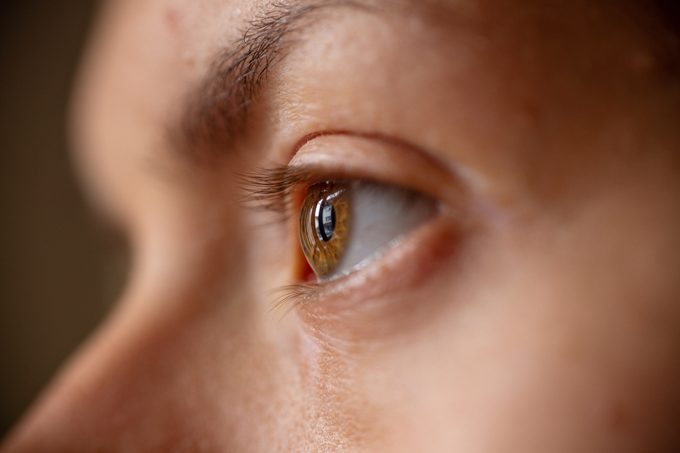
Common triggers for eye twitching
Here are the most common triggers or causes of eye twitching:
- eye dryness or irritation
- eye strain or untreated vision problems
- lack of sleep
- stress
- caffeine
- alcohol
- fatigue
- allergies
“The one that I see the most as an ophthalmologist is from dryness or irritation of the surface of the eye,” Dr. Krieger explains. “Other common causes are lack of sleep, stress, and excess caffeine.”
According to the experts, consuming caffeine or alcohol may lead to eye twitching by causing dehydration, which can cause muscle spasms.
Fatigue can also cause eye twitching, which often worsens with a lack of proper rest or sleep, per the American Society of Ophthalmic Plastic & Reconstructive Surgery (ASOPRS).
Someone’s eyes may also twitch if they are strained because of untreated vision problems. The experts says allergies can also cause inflammation around the eye that may lead to twitching.
Neurological or muscular causes
In rare cases, eye twitching relates to neurological or muscular conditions, in particular those that cause uncontrollable muscle movement, such as:
- Parkinson’s disease
- Meige syndrome
- Tourette syndrome
- Multiple sclerosis (MS)
- Bell’s Palsy
- Tardive dyskinesia
- Wilson’s disease
- dystonia
- seizures
Medications that cause eye twitching
Experts say some medications also can lead to eyelid twitching by causing dehydration, which can cause muscle spasms, or by reducing someone’s muscle control, such as:
- Parkinson’s medications
- stimulants
- sedating or anti-anxiety medications
- antipsychotic medications
- seizure medications
- calcium-channel blocking medications
- high blood pressure medications
Some neurological conditions, in particular MS and brain tumors, can also cause a condition known as nystagmus, in which the actual eye moves uncontrollably.
Natasha Herz, MD, clinical spokesperson for the American Academy of Ophthalmology, says nystagmus essentially means involuntary eye movement. She says the condition has this vague name to describe the many different ways it can cause the eyes to move.
“They may jerk upward, sometimes to the sides,” she says. Nystagmus can also cause torsion of the eye, where the eye rotates counterclockwise or clockwise.
Who experiences eye twitching
According to the experts, anyone of any age can develop eye twitching that may come and go.
But Dr. Patel says eye twitching often occurs in younger age groups.
Experts says people under a lot of stress or sleep deprivation may also be more likely to develop eye twitching.
People who look at screens and digital devices a lot, or read a lot, may also be more prone to eye twitching from eye strain, since they are using the muscles in and around their eyelids so much.
“It’s like standing on your tippy-toes for too long; eventually your calf muscles become sore and start to twitch or shake,” Dr. Herz says.
People also may experience more eye twitching if there are uncorrected vision problems, she adds. Still, it’s important to remember that sometimes eye twitching occurs randomly, when you’re not doing anything different or specific and don’t have the risk factors for twitching, Dr. Herz notes.
What it means if both eyes twitch
It’s more common for one eye to twitch at a time, experts say. If both eyes twitch at the same time, or if other parts of the face are involved, it might be time to consult with a doctor.
Here are some potential causes of two eyes twitching:
Benign essential blepharospasm (BEB)
“Eyelid twitching is concerning if it’s both eyes at the same time, [or] if the eyes forcibly close, meaning you cannot open them even if you want to,” Dr. Krieger says. “This is a condition known as benign essential blepharospasm and requires treatment.”
Most people with benign essential blepharospasm (BEB) initially experience an increase in their blinking rate, followed by twitching in both the upper and lower eyelids on both sides of the face, squeezing or twitching of the small muscles surrounding the eyes, trouble opening the eyes, and eventually the inability to open the eyes and see.
Most people with BEB experience occasional minor twitching or rapid blinking spells that progressively worsen over time until they cannot open their eyes.
“With blepharospasm, someone may suddenly shut their eyes as if they got poked in the eye,” Dr. Herz says. “They have to consciously focus on relaxing the eye muscles, and even then it can take a while before they can open their eyes again.”
Some instances of BEB may also involve muscles in the neck and mouth, which points to a condition called Meige syndrome, per the ASOPRS.
Researchers are still unsure what causes or contributes to BEB, but it may occur when parts of the brain in control of the eyelid muscles stop working properly.
There’s some evidence that BEB may be genetic, as in rare cases it seems to run in families, according to the National Organization for Rare Disorders (NORD).
Factors like bright lights, exhaustion, or emotional stress tend to worsen symptoms of BEB, and the condition tends to affect women between the ages of 40 and 60 more commonly, with the average age of onset being 56, according to the National Eye Institute and NORD.
Dr. Herz says people with BEB may need to wear special glasses designed to filter out brighter lights, even indoors.
Hemifacial spasm
Eye twitching also can be associated with a hemifacial spasm, which causes the eyes to close involuntary and affects muscles in the mouth, neck, and cheek on one side of the face. Dr. Herz says hemifacial spasms involve whole groups of muscles that all twitch or spasm at once.
“This wouldn’t be subtle,” she says. “It would be a pretty big deal, and should definitely cause you to think, ‘Wow, this isn’t a regular eye twitch.'”
Dr. Patel says hemifacial spasms are typical in two groups of patients.
“One group has previously had a facial palsy, called a Bell’s palsy,” he says. “As the nerve tries to grow back, it grows in a wrong direction so the eyelid muscles will squeeze [and spasm] when the person tries to chew or talk.” He says this condition is called aberrant nerve regeneration.
“The other type of hemifacial spasm is when the facial nerve is affected by the pulsation of vessels at the root of the nerve,” he says. “This is called ’emphatic transmission’ in the facial nerve.”
While essential blepharospasm and hemifacial spasms can be scary, it’s important to remember they are rare, and usually eye twitching is related to something far less serious, like dry eyes or a lack of sleep. Only around five out of every 100,000 people living in the United States experience BEB.
Eye twitching for days
Someone may have multiple attacks of eye twitching over the course of several days, but that is often because they continue to engage in or be exposed to ongoing risk factors triggering attacks, such as excess caffeine, lack of sleep, stress, or allergies.
“People with persistent risk factors can have persistent episodes of twitching, but it’s unusual to twitch continuously for multiple days,” Dr. Krieger says.
She adds that having several “twitch attacks” in a day is more common than experiencing continual twitching from waking until sleeping.
Dr. Herz says she often sees patients who have experienced eye twitching on one side that comes and goes for days, sometimes even weeks. This can be upsetting on its own, she notes, but can also lead them to worry they have a neurological condition.
But as long as the twitching is only affecting one eye and not a whole muscle group, she says this is usually harmless and will go away eventually.
Under-eye twitching and right and left eye twitching
Because spasms in the muscles that surround and support the eye may cause eye twitching, experts say twitching may affect more than just the eyelids, potentially causing twitching under, on the sides, or above the eye.
The experts say no known conditions tend to cause right or left eye twitching specifically.
Eye twitching from headache, stress, and anxiety
According to experts like Dr. Krieger, anxiety and stress can absolutely worsen twitching. “They can also interfere with sleep,” she says, “which puts you at increased risk for twitching.”
There are rare reports that suggest certain types of headaches, in particular cluster headaches, may somehow cause eye twitching, according to the Journal of Ophthalmic and Vision Research.
But there’s no solid evidence that headaches cause eye twitching or vice versa, though both may happen at the same time because the conditions share several risk factors.
“I don’t think that you specifically get eyelid twitches from headaches,” Dr. Herz says. “Certainly if someone experiences stress and some other factors likely to cause headache and twitching, both may occur at the same time, but one doesn’t seem to cause the other.” She adds other shared risk factors for both headaches and eye twitching include caffeine use and light sensitivity.
How to stop eye twitching
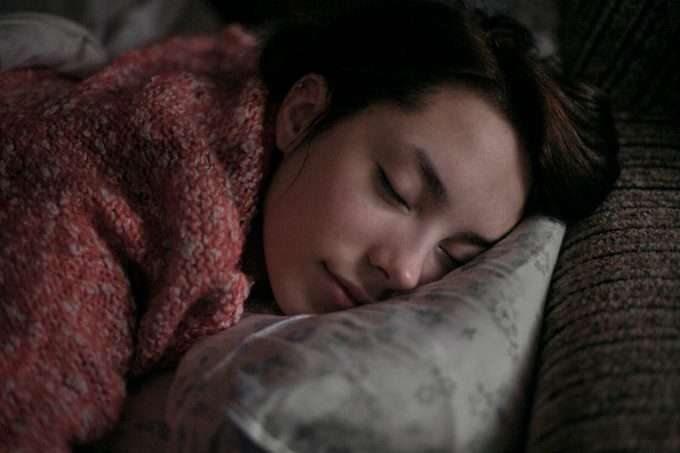
Dr. Patel says no at-home remedies for eye twitching are actually treatments or cures. But most experts say there are simple ways to soothe or potentially prevent eye twitching.
Reduce outside factors
“We could all probably stand to get more sleep,” Dr. Krieger says.
She adds that reducing caffeine intake may help reduce attacks of eye twitching if you’re having a lot of coffee or other caffeinated foods and drinks.
Reducing or managing stress also may help treat or prevent eye twitching from muscle tension or tired eyelid muscles. In some cases, someone may reduce eye twitching by reducing or stopping alcohol consumption and smoking.
Opt for these soothing remedies
“You can also use over-the-counter lubricating drops or artificial tears to relieve surface dryness and irritation of the eyes,” Dr. Krieger says.
Antihistamines might also help reduce eye twitching if it is related to itchy or dry eyes caused by allergies.
Staying hydrated may also reduce the risk of developing eye twitches from things that can cause dehydration, such as certain medications, alcohol, and caffeine.
Dr. Herz says she thinks it always helps to relax the muscles in the face by applying a wet, warm compress to the eye, such as a facecloth soaked in warm water. “It just feels so good immediately and you can just feel the muscles relaxing,” Dr. Herz says.
Take care of your vision
Taking frequent breaks when heavily straining the eyes can also help the muscles around the eyes rest, which may reduce the risk of twitching.
If someone has vision problems, wearing glasses or contacts may help reduce the amount of strain on their eyes and the risk of twitching.
Try to follow the 20-20-20 rule, too: Every 20 minutes, take a 20-second break to look at something 20 feet away.
Though more research is needed to determine their efficacy, some additional treatments may help mitigate eye twitching, such as:
- increasing intake of nutrients that help control muscle movement, such as calcium, folic acid, potassium, and phosphorous
- drinking tonic water
- taking multivitamins
Medical treatments for eye twitching
It is possible to get relief from regular, minor eye twitching at home using basic remedies, lifestyle changes, and over-the-counter products. More serious cases of eye twitching, such as those related to BEB and hemifacial spasms, typically require medical treatment.
Biofeedback
Blepharospasm is sometimes treated with biofeedback, a type of therapy that aims to help patients consciously control bodily functions normally controlled unconsciously, such as breathing or heart rate. Biofeedback is rarely successful in managing blepharospasm, according to the Kellogg Eye Center at University of Michigan Health.
Medications
Oral medications that are sometimes used to treat BEB include anticholinergic drugs, dopamine-depleting medications, and sedative medications such as clonazepam, diazepam, and baclofen. These too are rarely successful, according to the National Organization for Rare Disorders (NORD).
Botulinum toxin
According to all the experts interviewed, injections of botulinum toxin, a toxin created by Clostridium botulinum bacteria, is the most common and effective treatment for blepharospasm.
Also known as Botox, botulinum injections are administered by injecting small doses of the toxin into the muscles that surround the eyes, effectively relaxing the muscles and stopping the twitching.
“If [eye twitching] persist[s] longer than a few weeks, we tend to inject botulinum toxin,” Dr. Patel says. “This cures the majority of patients after just one or two injections.”
Three to four annual Botox injections keep attacks at bay, and the procedure has a high rate of success with few side effects.
In rare cases, a patient’s eyelids may temporarily droop, or they may have double vision. Most side effects associated with Botox injections to the muscles around the eyes go away within one to two weeks after receiving the injections.
Surgery
In severe cases, or those that don’t respond to Botox injections, surgery to remove some of the muscles that control eye and eyelid movement alongside Botox therapy is an option.
Botox therapy is normally the first treatment for hemifacial spasms. If it’s not effective, microvascular decompression surgery may occur where pressure on the facial nerve is reduced, though it carries the risk of serious neurological complications.
When to see a doctor about eye twitching
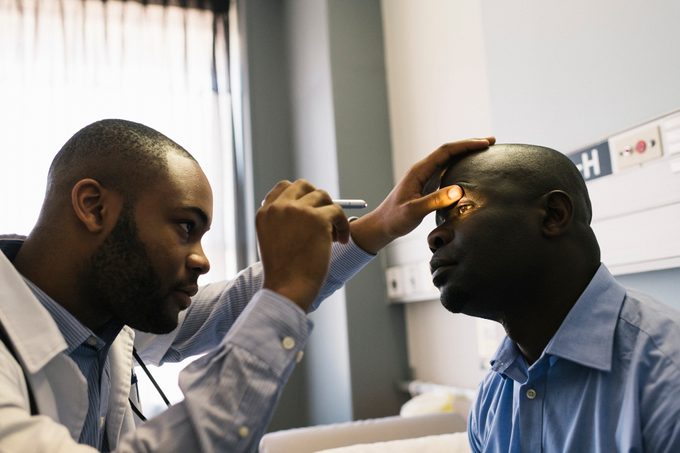
Experts say that if both eyes are twitching at the same time, eyelid twitching occurs for more than a few weeks, or the eyes close entirely during twitching, you may want to talk to an eye care specialist like an ophthalmologist.
“If twitching of one or more eyelids persists more than four weeks, it is wise to seek advice from a physician,” Dr. Patel says.
“Other concerning signs are if more than just the eyelids are involved,” Dr. Krieger says. “For example, if both your eyelid and one side of your cheek or one side of your mouth is also twitching.”
She explains this may mean pressure or irritation of the nerve controlling the muscles of the face, and it should be evaluated.
“Finally, if [eye twitching] is happening very frequently or is very persistent, then seeing your eye doctor to ensure the surface of your eye is healthy is a good idea,” she adds.
You also should see an eye doctor if eye twitching doesn’t improve, Dr. Krieger says, or won’t go away with simple lifestyle changes, at-home remedies, or over-the-counter products. Other potential reasons to seek medical attention include changes in vision or red, drooping, or swollen eyelids.
Now that you know the answer to the question, “what does it mean when your eye twitches,” check out these scary but harmless symptoms.


